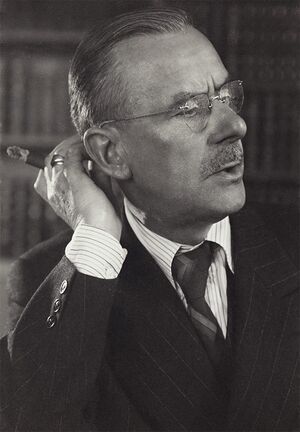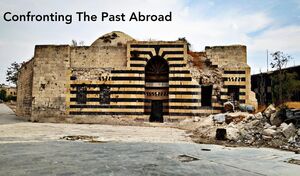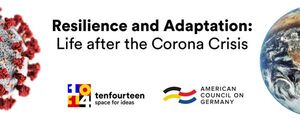Thomas Mann House Events Archive
June 2020
Exhibition: Thomas Mann »DEMOCRACY WILL WIN!«
Stiftung Buch-, Medien- und Literaturhaus München (Salvatorplatz 1, 80333 München)

Information
»Es ist mit der Selbstverständlichkeit der Demokratie in aller Welt eine zweifelhafte Sache geworden. Es ist die Stunde gekommen […] für eine Selbstbesinnung der Demokratie, für ihre Wiedererinnerung, Wiedererörterung und Bewußtmachung – mit einem Wort: für ihre Erneuerung im Gedanken und im Gefühl.« - THOMAS MANN: VOM ZUKÜNFTIGEN SIEG DER DEMOKRATIE, 1938
We are currently seeing the fundamental values of democracy being called into question. Populism and nationalism are placing democratic societies under massive pressure. The exhibition " Thomas Mann: Democracy will win!" of the Literaturhaus München represents a concrete contribution to the current debate about our democracy. It is intended to contribute to its "recollection, reconsideration and reawakening", to the "renewal of democracy in thought and feeling".
*Euro 7.- / 5.-
STUDENT SPECIAL: On Mondays students pay only 2 Euros
Partners
A cooperation with LITERATURHAUS MÜNCHEN. Supported by the German Federal Foreign Office.
“Confronting the Past Abroad:" A Conversation with Ayham Majid Agha, Mohamed Amjahid, Olga Grjasnowa and Josh Kun
Online

Information
A quarter of the population in Germany today has a migrant background. Many refugees and migrants seek protection from the violence and war atrocities they have experienced in their countries of origin. Their experiences of injustice have so far played only a minor role in the German political discourse.
In the western German city of Koblenz, a process is currently underway which could help change this. There, the former head of investigation of the Syrian State Security and another former official are accused of torture in several thousand cases and multiple murders. The trial is a sign that the world will not forget. As in the United States, crimes against humanity can be prosecuted by the German justice system even if they were neither committed in Germany nor if Germans were among the perpetrators or victims.
Thomas Mann Fellow Mohamed Amjahid has reported on the groundbreaking trial for the German weekly DIE ZEIT. Together with the writer Olga Grjasnowa, the Syrian theater maker Ayham Majid Agha and the music scholar, author and curator Josh Kun, he will speak about the violent experiences of migrants in Germany and the US and discuss how these are reflected in contemporary literature, theater and music.
The event will be streamed online on Sunday, June 14, 2020 at 11 am (PST)
Participants
Ayham Majid Agha is a theater director and actor at Gorki Theater in Berlin. He was trained as an actor at the Academy of Performing Arts in Damascus and studied in Italy and the UK. After a successful career at home, he left Syria. He has been affiliated with the Gorki Theater since 2016. In the season 2017/18 his play “Skelett eines Elefanten in der Wüste” premiered at the Gorki which was invited to the “Radikal Jung” Festival where Ayham Majid Agha won the Young Critics Award. He is married to the novelist Olga Grjasnowa.
Mohamed Amjahid was born as the son of so-called guest workers in Frankfurt am Main. He studied political science in Berlin and Cairo and conducted research on various anthropological projects in North Africa. During his studies, he worked as a journalist for taz, Frankfurter Rundschau and Deutschlandfunk. He has worked as a political reporter for the weekly newspaper Die Zeit and the Zeit Magazin. Anthropologically and journalistically, he focuses on human rights, equality and upheaval in the US, Europe, the Middle East and North Africa. Mohamed Amjahid is a 2020 Thomas Mann fellow.
Olga Grjasnowa was born in Baku, Azerbaijan. In 1996 her family emigrated and settled in Germany as “quota refugees”, where she learned German at the age of 11. After studying abroad in Leipzig, Poland, Russia, and Israel, Grjasnowa took up dance studies at the Freie Universität Berlin. Her critically acclaimed debut novel “All Russians Love Birch Trees” won the Klaus-Michael Kühne Prize and the Anna Seghers Prize in 2012. Her latest book “City of Jasemine" came out in 2017. Grjasnowa is married to theatre director and actor Ayham Majid Agha.
Josh Kun is a music scholar, author, and curator exploring the ways in which the arts and popular culture are conduits for cross-cultural exchange. He is Director of the USC Annenberg School of Communication, where he holds the Chair in Cross-Cultural Communication. His work has an emphasis on the impact of displacement, relocation, deportation, and immigration on contemporary global music practices. In 2016 he was named a MacArthur Fellow and in 2018, he was Bosch Fellow at the American Academy in Berlin.
Partners
An event by the Thomas Mann House in collaboration with 1014 and Miry's List.


"Resilience and Adaptation: Social Inequity and the Corona Crisis." Discussion with Jutta Allmendinger
Online

Information
The combined public health and economic crises have exacerbated social inequity in our societies. Social injustice and police brutality have led to widespread protests and unrest. From essential workers risking their lives on minimum wage to poor living conditions to inadequate access to health care and the digital world, we must right many existing wrongs in the United States and in Europe. German sociologist Prof. Dr. Jutta Allmendinger and American community leader Bill Strickland will discuss how to heal and preserve the fabric of our communities. This event is being held with support from the Thomas Mann House.
Participants
Prof. Dr. Jutta Allmendinger is Professor of Sociology at the Humboldt University in Berlin and President of the Wissenschaftszentrum Berlin für Sozialforschung (WZB) (Social Science Research Center Berlin). She received her training in sociology and social psychology at the University of Mannheim (M.A. 1982), the University of Wisconsin, Harvard University (Ph.D. 1989), and the Free University of Berlin (Habilitation 1993). In 2019, she was a fellow in residence at the Thomas Mann House in Los Angeles.
Dr. Allmendinger worked as Researcher at the Center for Survey Research and Methodology (Zentrum für Umfragen, Methoden und Analysen, ZUMA) in Mannheim (1981-83), as Research Assistant at Harvard University and at the Center for Educational Sciences at the University of Wisconsin (1984-88). From 1988 to 1991, she was Senior Researcher at the Max Planck Institute for Human Development in Berlin. From 1999-2002, she was Chairperson of the German Society for Sociology (DGS), from 1992 to 2007 she was Full Professor of Sociology at the University of Munich and, from 2003 to 2007, Director of the Institute for Employment Research (Institut für Arbeitsmarkt- und Berufsforschung der Bundesagentur für Arbeit, IAB) in Nürnberg. In the academic year 1991-1992 she was Fellow at the Harvard Business School in Cambridge (Program for Organizational Behavior) and, in the academic year 1996-1997, Fellow at the Center for Advanced Study in the Behavioral Sciences at Stanford.
Dr. Allmendinger holds memberships in the Scientific Commission of the German Science and Humanities Council (Wissenschaftsrat), the Berlin-Brandenburg Academy of Sciences and Humanities (BBAW), the expert commission “Research und Innovation” of the German Federal Ministry of Education and Research, the German Academy of Natural Scientists Leopoldina, and in the Foundation Council of the European University Viadrina Frankfurt (Oder). She is editor in chief of the Zeitschrift für Arbeitsmarkt Forschung (ZAF) (Journal for Labor Market Research) and was coeditor of the Journal of European Societies (1998-2001). Dr. Allmendinger has published 11 books and over 140 articles, mostly in peer-reviewed journals on social inequality, educational sociology, labor market research, demography, and social stratification.
William E. Strickland grew up in the Manchester neighborhood of Pittsburgh, Pennsylvania, and graduated from Oliver High School. He then attended the University of Pittsburgh, where as an undergraduate he founded the Manchester Craftsmen's Guild as an after-school program to teach children pottery skill in his old neighborhood. He graduated cum laude with a bachelor's degree in American history and foreign relations in 1970. Following graduation he continued to build the Manchester Guild into an innovative nonprofit agency that uses the arts to inspire and mentor inner-city teenagers. In 1972 he took over the Bidwell Training Center that trains displaced adults for jobs.
He has served on the boards of the National Endowment for the Arts, Mellon Financial Corporation, and the University of Pittsburgh. For his work, Strickland has won various awards including a MacArthur Fellowship "genius" award in 1996. He has been honored by the White House, and received the Goi Peace Award in 2011.
In June 2018, Strickland announced that he would be stepping down from his role as president and CEO of Manchester Bidwell Corp., but that he will remain on as executive chairman. He had served as the leader of the organization for 50 years.
Partners
An event by 1014 and the American Council on Germany with support from the Thomas Mann House.


#LNDI2020: The public space in times of crisis
Online
Information
Global crises shape the public space. Due to the Covid 19 pandemic, life has largely shifted into the private and digital realms. It will probably be a long time before subways and concert halls fill up again, while at the same time hundreds of thousands take to the streets to protest against police violence and racism. How must the public space change in order to reconcile social participation and social distancing? How can life despite recurring crises be made socially acceptable? Urban planning and architecture are increasingly asked to investigate the resilience of spaces.
Thomas Mann Fellows Doris Kleilein and Friederike Meyer will talk with Oliver Elser and Felix Weisbrich about the impressions and events of the past months and ask about their significance for the public space. The conversation will be in German.
Participants
Oliver Elser is curator at the German Museum of Architecture (DAM) in Frankfurt am Main. In 2016 he curated "Making Heimat", the German Pavilion at the Venice Architecture Biennale. At DAM he has shown exhibitions on Brutalism, Postmodernism, 20th century architectural models and Simon Ungers. In 2012/13 he was substitute professor for scenography at the University of Applied Sciences Mainz. As a freelance curator he conceived the exhibition "Housing Models: Experimentation and Everyday Life" (Vienna, Sofia and Belgrade) together with Michael Rieper. Since 1999, he has developed the project "Special Models" together with the artist Oliver Croy, last presented in 2013 at the Art Biennale in Venice in the "Palazzo Enciclopedico".
Doris Kleilein is an architect, author and since 2018 director of the architectural book publishing house JOVIS in Berlin. After studying architecture in Berlin and Winnipeg, she co-founded the architectural office bromsky and worked as a freelance author for radio, print and online with a focus on architecture, city and politics. From 2005 to 2018 she was editor of the architecture journal Bauwelt, where she published mainly on new housing models, urban development and the effects of migration on architecture and urban planning. In cooperation with Ballhaus Naunynstraße she curated performative courses in urban space. In 2014 she was appointed to the Women's Advisory Council of the Berlin Senate Department for Urban Development and Environment.
Friederike Meyer is an architecture journalist in Berlin. She is interested in the interface between architecture, urban development and society. She studied architecture at the RWTH Aachen and as a DAAD scholarship holder at the University of Washington in Seattle. She trained as a journalist at the Protestant Media Academy in Berlin and has since worked as an author, presenter and juror. In Kaiserslautern she teaches architectural communication. From 2000 to 2017 she was editor of the architecture journal Bauwelt. Since 2017, she has been editor-in-chief of the BauNetz newsroom.
Felix Weisbrich is head of the Friedrichshain-Kreuzberg Roads and Green Spaces department and is considered the mastermind behind the Berlin pop-up bike lanes, which were set up in a very short time during the first Corona months. He studied forestry science and worked in various functions in the forestry administration of Mecklenburg-Vorpommern: as forestry policy advisor in the Ministry of Agriculture in Schwerin, as logistician for energy wood production and as head of the forestry office in Bad Doberan. He was involved in questions of administrative modernization, represented the highest forestry authority in legislative procedures and in conflicts over construction and use, e.g. in the coastal forests around Heiligendamm. In his current position he is responsible for complex public spaces such as Görlitzer Park and the traffic systems in one of the most densely populated urban areas in Europe.
Partners
Organized by Thomas Mann House, the German Museum of Architecture (DAM) in Frankfurt am Main, Jovis Verlag and the online magazine BauNetz as part of the German Federal Foreign Office's Long Night of Ideas 2020.
The Thomas Mann Fellowships are funded by the Berthold Leibinger Stiftung, the Robert Bosch Stiftung and the Alfried Krupp von Bohlen und Halbach-Stiftung.
The German Federal Foreign Office and its partners cordially invite you to take part in the fifth "Long Night of Ideas" on June 19. How can culture continue to play its vital role even in times of Corona? How can it unfold its unique powers even in times of crisis? The "Long Night of Ideas", – for the first time a digital program only, will approach these questions.
From the topic of sustainability of the club scene to Southeastern European films and the science slam on European science policy: under the title "Cultures of the Future - Future of Cultures", more than a dozen digital events will deal with the future of cultural life. Because: Especially in times of Corona, when direct human contact must remain limited, overcoming this physical distance through culture is all the more important - for the individual as well as for society. The Long Night of Ideas is a team effort by the Federal Foreign Office, its intermediary organizations and other strong partners from civil society, research and science organizations and private foundations. | #LNDI2020
More information on the Long Night of Ideas 2020 and the complete program under www.diplo.de/lndi2020





